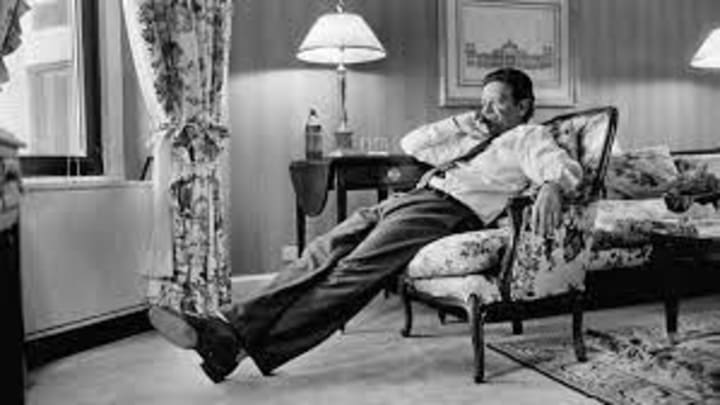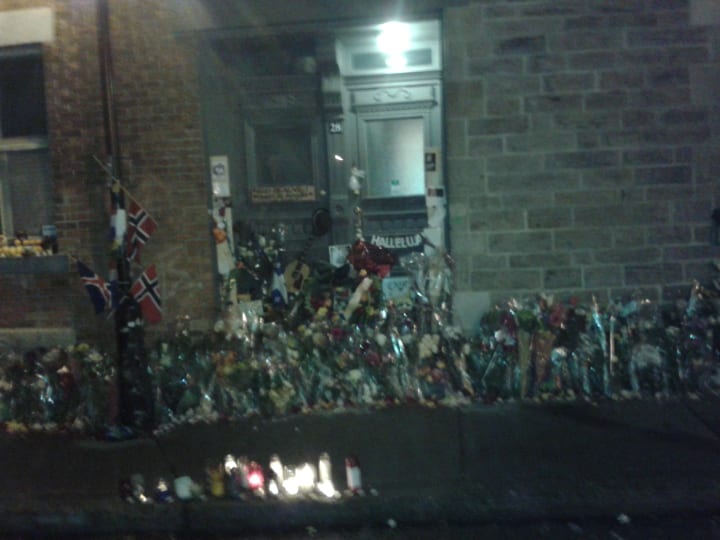Sacred Cows
Thinking Unthinkable Thoughts on Literature in Canada

Why do sacred cows make the most delicious meat?
I have had many unthinkable thoughts about certain issues in literature that I have longed to share, but I am Canadian, and as such, we are conditioned to view literature as another form of “nation-building,” meaning that we should all be in this together for the team and not point a finger at what is glaringly obvious (our emperors are always fully dressed). And I believed this for a very long time. I thought that the best thing to do was to go along with the herd and try to accept the received opinions and general views of our novels and writers. It was certainly easier to believe that our talent was ignored by the ignorant and that we were writing work that deserved to be compared with the greats. It really was an easy way to go…until it wasn’t anymore.
My moment came with a review, not a book. I decided to pick up a copy of Barbara Gowdy’s “The White Bone”. For those of you who have never heard of it – an envied crowd – it is all about a family of elephants determined to find the “Safe Place” where the white bone exists and they will be saved. One elephant called Mud – I will get into the names in a minute – has a vision of such a place free from poachers and drought, and convinces the other elephants to believe in what she sees.
With this kind of material, you would expect at least an interesting narrative, something unique in the world of literature from the point of view of animals (I thought of “Watership Down”, “Animal Farm”, and Beatrix Pottter’s best efforts); I thought that I would love to spend time with characters called Mud, She-Snorts, Torrent, Tall Time, Bent and the like; I thought that this was a unique moment in my view of how literature could be written in this country.
Have I made it plain how none of the above was the result of my reading?
It was one of the most inhumanly dull books I ever read, and it prevented me from taking a chance on anything else that came from the imagination of Ms. Gowdy (a real pity; I should try to look at “Mr. Sandman” or “The Romantic” one day; they can’t all be failures). I was truly disappointed.

But remember what I wrote: my moment of disappointment came from a review.
I probably would not have picked up the book if not for the review on the cover by another Canadian writer. Alice Munro praised the novel as “a marvel of a book”. Perhaps she was right; it really is a marvel how such a book could have inspired any praise from a writer whose short stories are some of the best ever written in this country. Maybe there was an implicit pressure from publishers and the establishment for the grand dame of literature – sorry, Ms. Atwood; Nobel laureates trump Canuck praise – and she had to say something “nice” about the book. But I have to wonder…
I still wonder… One of the great complaints that students of literature have had about criticism of our work is how “nice” the critics were and are. The Globe and Mail’s once great literature section slowly became a sort of advertising supplement in the paper that was a guide to our literary greatness without really explaining what made it so great. It was often used to complain and warn against the “growing hegemony” of American culture (that is a direct quote from somewhere), and eventually became just another section between Sports and Fashion, and just as forgettable. And the problem has not gone away. There are plenty of complaints about other journals of repute involved with writers and writing (an interview with a contributor to The Montreal Review of Books confirms many of the thoughts expressed here), and it does not seem to be getting any better out there.
I understand. It is very hard to be the nail that sticks out in a world full of hammers ready to put you down. But this does nothing to help us as writers and artists. You cannot expect the world to take our work seriously if we do not sit down and take the time to be serious.
And I cannot continue this piece without mentioning the example of V.S. Naipaul.

In his very sharp and knowing criticism, the writer was dismissive of Graham Greene, Evelyn Waugh (the “Sword of Honour” trilogy), Vladimir Nabokov, Henry James (at least for the novels), William Golding, Gustave Flaubert’s “Salammbo” and “Sentimental Education”, and John Updike (he dismissed the latter as a creator of “golden sentences” and nothing more).
Now, this can be quite shocking for those of you who consider any of the above names the pinnacle of literature of the last two centuries. I had to readjust my thinking when I read his critiques and reread their work (I understood why he was so harsh). But I also learned something else: knowing what you no longer have to read is a fantastic gift for a reader and writer. As Naipaul has pointed out, it is part of one’s growing maturity to know what you can go to learn from instead of what you are told to admire and then slog through as a sort of aesthetic punishment.
I have kept his thoughts in mind as I read. My admiration for writers like Etgar Keret, Zadie Smith, Salman Rushdie, Shirley Jackson, Milan Kundera, Italo Calvino, the nineteenth century Russians and some of the masters of science fiction (Asimov, Adams, Dick, Delaney) and horror (King, Lovecraft, Straub, Matheson) is proof enough for me that I have not limited the work that I love to one geography; one national identity.
And I have to end this with an incident that still haunts me.

Many years ago, I attended a literary conference where the work of the then still-living Leonard Cohen was discussed by a group of writers, poets and musicians. I thought that it would simply be a review of the best moments of the poet of gloom and all of the incredible work he created. Instead, it felt like a political rally. There was even a vote as to whether Cohen deserved the Nobel Prize in Literature taken before and after the talk (guess how the votes swung that night?) I refused to put my hand up and quickly left the event, somehow ending up at a bookstore and looking at a collection of Cohen’s work. The cover photo was striking (black and white print that made him seem like a less malevolent gargoyle). It was clearly a pose that worked for him and on us. And I say this as a fan of Cohen: we cannot keep doing this to ourselves if we want to be taken seriously as a community of writers who want to have a place in the world of literature. Special pleading and group therapy sessions do not earn anyone respect, especially among those who judge the work therein.
Please, go out and read what you can and understand all that can be understood. We need more of you to find those sacred animals and hunt them down with purpose.

Thank you for reading!
If you liked this, you can add your Insights, Comment, leave a Heart, Tip, Pledge, or Subscribe. I will appreciate any support you have shown for my work.
You can find more poems, stories, and articles by Kendall Defoe on my Vocal profile. I complain, argue, provoke and create...just like everybody else.
Give it a look...
About the Creator
Kendall Defoe
Teacher, reader, writer, dreamer... I am a college instructor who cannot stop letting his thoughts end up on the page.
And I did this: Buy Me A Coffee... And I did this:






Comments
There are no comments for this story
Be the first to respond and start the conversation.